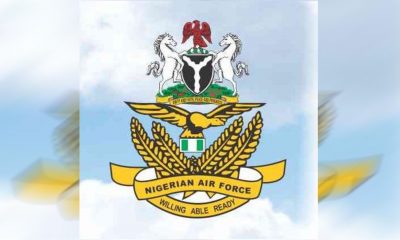Opinion
Where Is Belgore’s Committee?
In August 2009, President Umaru Musa Yar’Adua was compelled by organised labour in the country to set-up a committee for a new policy on minimum wage which was headed by a retired Chief Justice of the Federation, Justice Belgore. The decision by the federal government to set up the panel was sequel to the move by the House of Representatives to pass for the second reading, a bill for a new minimum wage of N30,000. This move by the House was in addition to the pressure from labour on the government to do likewise.
This might be one area where the House was touched by the lamentations of workers having sensed that the presidency appeared unperturbed about the agitation for a new minimum wage. Every Nigerian knows that an assignment such as the one given to the committee should have a time-frame to enable the federal government study the report, draft a bill and send to the National Assembly for passage into law and assent. Surprisingly, in this case, no time-frame was given, which was a demonstration of the government’s lack of interest in the whole agitation. But if the apathy by the federal government towards the committee it set up is pardonable, the silence of organised labour is astonishing.
It was marvelous to observe that the leadership of both the Nigeria Labour Congress, NLC, and Trade Union Congress, TUC, the umbrella bodies for most labour unions in the country, who should have raised objection to the considered omission of time-frame for the committee, kept sealed lips.
The silence of leaders of the major two labour unions was eventually interpreted by many to mean that they might have been bribed to maintain a studied silence on the agitation for a new minimum wage for the oppressed workers of the country. On the side of the federal government, the ill-health and eventual trip abroad of President Yar’Adua was used as an excuse to delay the work of the committee. While the seeming orchestrated apathy was on, workers were expectant that the new minimum wage policy would be implemented by January this year.
But while the expectation of workers lingered, another abominable act was perpetrated by the Acting President, Dr. Goodluck Jonathan. The Acting President, who was expected to request for the completion and submission of Justice Belgore’s committee’s report, suddenly turned around and instituted a parallel committee on minimum wage with a three-month time – frame.
This is unacceptable. An administrative faux pas. It is a clear deception. Now, by April when the committee should submit its report, it might decide to act the Nigerian way by asking for an extension of about two months to enable them enjoy fat sitting and travelling allowances. When the report is eventually submitted say June or July it may take another two or three months for the federal government to study it. Then it will be sent to the National Assembly that will in turn take some time to deliberate on it. When it is passed eventually, its assent by the Acting President will take another time. Then it might be signed as 2011 not 2010 Minimum Wage Act.
The question one the lips of every worker and indeed Nigerians is, was the Acting President not aware of the existence of Justice Belgore’s committee? Why didn’t the then Minister of Labour and Productivity intimate the Acting President the existence of that committee? Was it a deliberate act to frustrate the workers and dim their hopes for better days ahead?
At this point, one expects that labour should raise objection. But alas it is not so.
This has further confirmed the speculation that both labour and the federal government have something up their sleeve on the issue. Or else how could one explain this scenario?
Whether the government likes it or not, the issue of new minimum wage must be addressed before the commencement of the deregulation of Petroleum industry and this is in tandem with good logic and realities of the day.
Arnold Alalibo
Opinion
Why Reduce Cut-Off Mark for C.O.E ?
Opinion
Welcome! Worthy Future For R/S
Opinion
Restoring Order, Delivering Good Governance
The political atmosphere in Rivers State has been anything but calm in 2025. Yet, a rare moment of unity was witnessed on Saturday, June 28, when Governor Siminalayi Fubara and Minister of the Federal Capital Territory, Chief Nyesom Wike, appeared side by side at the funeral of Elder Temple Omezurike Onuoha, Wike’s late uncle. What could have passed for a routine condolence visit evolved into a significant political statement—a symbolic show of reconciliation in a state bruised by deep political strife.
The funeral, attended by dignitaries from across the nation, was more than a moment of shared grief. It became the public reflection of a private peace accord reached earlier at the Presidential Villa in Abuja. There, President Bola Ahmed Tinubu brought together Governor Fubara, Minister Wike, the suspended Speaker of the Rivers State House of Assembly, Martin Amaewhule, and other lawmakers to chart a new path forward.
For Rivers people, that truce is a beacon of hope. But they are not content with photo opportunities and promises. What they demand now is the immediate lifting of the state of emergency declared in March 2025, and the unconditional reinstatement of Governor Fubara, Deputy Governor Dr. Ngozi Odu, and all suspended lawmakers. They insist on the restoration of their democratic mandate.
President Tinubu’s decision to suspend the entire structure of Rivers State’s elected leadership and appoint a sole administrator was a drastic response to a deepening political crisis. While it may have prevented a complete breakdown in governance, it also robbed the people of their voice. That silence must now end.
The administrator, retired naval chief Ibok-Ette Ibas, has managed a caretaker role. But Rivers State cannot thrive under unelected stewardship. Democracy must return—not partially, not symbolically, but fully. President Tinubu has to ensure that the people’s will, expressed through the ballot, is restored in word and deed.
Governor Fubara, who will complete his six-month suspension by September, was elected to serve the people of Rivers, not to be sidelined by political intrigues. His return should not be ceremonial. It should come with the full powers and authority vested in him by the constitution and the mandate of Rivers citizens.
The people’s frustration is understandable. At the heart of the political crisis was a power tussle between loyalists of Fubara and those of Wike. Institutions, particularly the State House of Assembly, became battlegrounds. Attempts were made to impeach Fubara. The situation deteriorated into a full-blown crisis, and governance was nearly brought to its knees.
But the tide must now turn. With the Senate’s approval of a record ?1.485 trillion budget for Rivers State for 2025, a new opportunity has emerged. This budget is not just a fiscal document—it is a blueprint for transformation, allocating ?1.077 trillion for capital projects alone. Yet, without the governor’s reinstatement, its execution remains in doubt.
It is Governor Fubara, and only him, who possesses the people’s mandate to execute this ambitious budget. It is time for him to return to duty with vigor, responsibility, and a renewed sense of urgency. The people expect delivery—on roads, hospitals, schools, and job creation.
Rivers civil servants, recovering from neglect and under appreciation, should also continue to be a top priority. Fubara should continue to ensure timely payment of salaries, address pension issues, and create a more effective, motivated public workforce. This is how governance becomes real in people’s lives.
The “Rivers First” mantra with which Fubara campaigned is now being tested. That slogan should become policy. It must inform every appointment, every contract, every budget decision, and every reform. It must reflect the needs and aspirations of the ordinary Rivers person—not political patrons or vested interests.
Beyond infrastructure and administration, political healing is essential. Governor Fubara and Minister Wike must go beyond temporary peace. They should actively unite their camps and followers to form one strong political family. The future of Rivers cannot be built on division.
Political appointments, both at the Federal and State levels, must reflect a spirit of fairness, tolerance, and inclusivity. The days of political vendettas and exclusive lists must end. Every ethnic group, every gender, and every generation must feel included in the new Rivers project.
Rivers is too diverse to be governed by one faction. Lasting peace can only be built on concessions, maturity, and equity. The people are watching to see if the peace deal will lead to deeper understanding or simply paper over cracks in an already fragile political arrangement.
Wike, now a national figure as Minister of the FCT, has a responsibility to rise above the local fray and support the development of Rivers State. His influence should bring federal attention and investment to the state, not political interference or division.
Likewise, Fubara should lead with restraint, humility, and a focus on service delivery. His return should not be marked by revenge or political purges but by inclusive leadership that welcomes even former adversaries into the process of rebuilding the state.
“The people are no longer interested in power struggles. They want light in their streets, drugs in their hospitals, teachers in their classrooms, and jobs for their children. The politics of ego and entitlement have to give way to governance with purpose.
The appearance of both leaders at the funeral was a glimpse of what unity could look like. That moment should now evolve into a movement-one that prioritizes Rivers State over every personal ambition. Let it be the beginning of true reconciliation and progress.
As September draws near, the Federal government should act decisively to end the state of emergency and reinstate all suspended officials. Rivers State must return to constitutional order and normal democratic processes. This is the minimum requirement of good governance.
The crisis in Rivers has dragged on for too long. The truce is a step forward, but much more is needed. Reinstating Governor Fubara, implementing the ?1.485 trillion budget, and uniting political factions are now the urgent tasks ahead. Rivers people have suffered enough. It is time to restore leadership, rebuild trust, and finally put Rivers first.
By: Amieyeofori Ibim
Amieyeofori Ibim is former Editor of The Tide Newspapers, political analyst and public affairs commentator
-
Politics1 day ago
Alleged Money Laundering: Fayose Has No Case To Answer, Court Tells EFCC
-

 Politics1 day ago
Politics1 day agoAtiku Quits PDP, Says Decision Heartbreaking
-
Rivers1 day ago
CDS Urges Communities To Protect Pipelines
-
Politics1 day ago
Atiku’s Exit No Problem To PDP – Makinde
-

 News1 day ago
News1 day agoShettima, Atiku, Obi Attend Buhari’s Fidau Prayer In Daura
-

 News1 day ago
News1 day agoJAMB Uncovers 9,469 Fake Admissions In 20 Tertiary Institutions
-

 News1 day ago
News1 day agoNAF Disowns Recruitment Adverts, Says It’s Fake
-
Rivers1 day ago
Okrika Administrator Seeks To Connect Okujagu Ama To National Grid … Donates 30 Life Jackets To Okujagu Ama Boat Drivers

